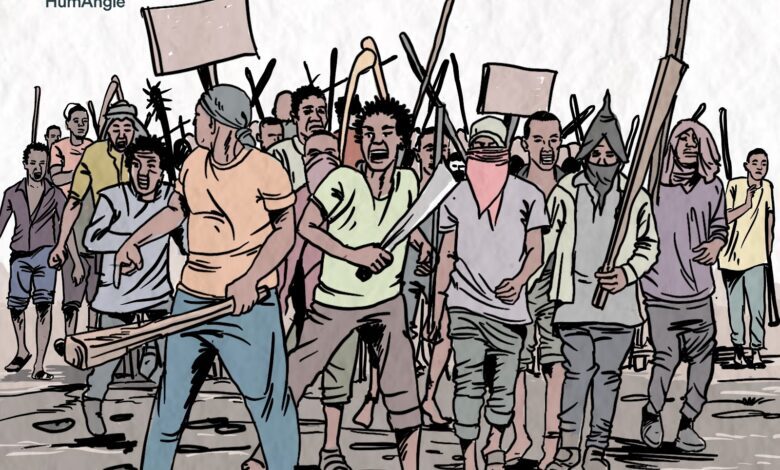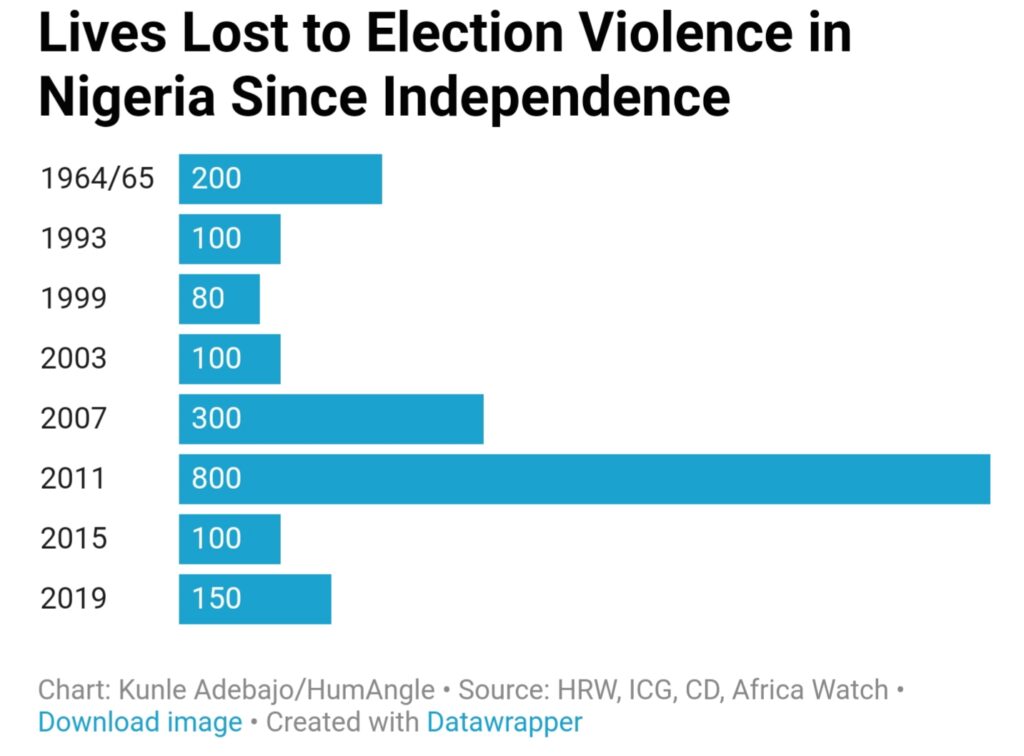2023: Election Campaigns Have Begun, So Has The Violence
Since the start of the electioneering campaign, there have been assassinations, violent attacks on the electoral regulator’s facilities and disruptions of party rallies.

On Monday, Nov. 28, armed men killed Victoria Chintex, a women’s leader in the Labour Party (LP) at her residence in Kaura Local Government Area (LGA) of Kaduna, Northwest Nigeria.
According to Edward Buju, the publicity secretary of the party in Kaduna south senatorial zone, the deceased’s husband also sustained gunshot injuries and is currently receiving treatment at a medical facility.
As of the time of this report, it is not clear whether the killing was a political assassination. The police have, however, launched an investigation into the incident.
Chintex’s killing came two months after gunmen attacked the convoy of Ifeanyi Ubah, the senator representing Anambra South in Enugwu-Ukwu, a community in Njikoka LGA of Anambra State, Nigeria’s Southeast.
The attack led to the death of five people, including two policemen and three civilians. Two other police officers were seriously injured.

In the latest incident, Mohammed Sani Musa, currently seeking a second term as senator for Niger east senatorial district in the Northcentral, narrowly escaped an assassination attempt on Dec. 3.
The would-be assailants reportedly followed the Senator from Abuja to his residence in Minna. They were coming down from their vehicle with weapons out when the police attached to the senator caught them.
Election violence
With less than three months to Nigeria’s next presidential election, political parties are in full campaign mode, but signs are emerging that wider election-related violence is a real possibility.
The current attacks and the assassination of political stakeholders are a visible symptom of the major problems Nigeria has been beset by since the return to civilian rule in 1999. Political parties and leaders have in the past used thugs to attack their opponents, and so far indications are that this time will be the same.
Having become the standard feature of Nigerian politics, the thugs are more frequent every successive election and rewarded with oil deals or key positions in the road transport workers association, where they collect tax from helpless motorists.

Under the Electoral Act, violence connected to elections is punishable with up to four years imprisonment, or a fine of ₦500,000 ($1,124.08) or both. The recurring violence and attacks show lack of respect for the law.
Attack on INEC
HumAngle understands that there have been several attacks on the facilities of the Independent National Electoral Commission (INEC) across the country in the last few months.
While many pundits have argued that the purpose of these attacks could be to force the government to shift the polls, others told our reporter that the focus of the hoodlums perpetrating the attacks could be to instil fear in the electorates and promote apathy on election day.
“The violence being witnessed is basically targeted at citizens planning to vote in 2023. With the kind of violence being recorded, many electorates will stay back in their respective houses on election day and this would help the bad guys emerge through voter apathy because serious Nigerians will run for their lives,” said Tunde Aremu, a political scientist at Obafemi Awolowo University.
For the fourth time in three weeks, arsonists, on Dec. 3, razed one of the offices of INEC, in Orlu LGA of Imo. According to INEC spokesperson, Festus Okoye, the attacked facility had been undergoing extensive renovation following an earlier attack.
On Nov. 27, INEC office in Izzi LGA of Ebonyi, was set ablaze by hoodlums. The fire destroyed 340 ballot boxes and a yet to be determined number of permanent voters’ cards.

While the attacks on INEC facilities in the Southeast and South-south have been attributed to the outlawed Indigenous People of Biafra (IPOB), there have also been unprecedented attacks in the Southwest.
On Nov. 10, one of the commission’s offices in Abeokuta, Ogun State’s capital, was attacked, leading to the destruction of 65,000 uncollected permanent voter’s cards, 904 ballot boxes, 29 voting cubicles, 30 megaphones, 57 election bags and eight electric power generators.
On the same day, one of the commission’s offices in Osun State was also set ablaze by some unknown attackers.
Though INEC chairman, Mahmood Yakubu, has on several occasions assured Nigerians of the commission’s commitment to delivering credible elections in spite of the challenges, the electoral body’s spokesperson, Okoye lamented that attacks are “too many”, saying it may have negative consequences on its preparations for the 2023 general election.
Political parties under attack
Since Sept. 28 when the campaigns officially started, different political parties have suffered attacks at campaign events.
Nigeria, as of mid-November, had recorded 52 acts of political violence across 22 states between Oct. 8 and Nov. 9, according to a statement by the National Security Adviser (NSA) to the President, Babagana Monguno.
While the Labour Party has lamented the harassment of its supporters in Ebonyi, Nasarawa, Katsina, and Lagos states, the Peoples Democratic Party (PDP) has raised concerns over attacks on its members in Kaduna, Port Harcourt, Zamfara, and Borno states.

Other parties have also had their billboards destroyed in different states of the country. Despite laws forbidding this, perpetrators get away with it.
INEC advocates for electoral offences commission
In a bid to curb the menace, INEC has continued to advocate for the creation of an Electoral Offences Commission with the responsibility of prosecuting electoral offenders and ensuring that electoral offences are properly dealt with.
The commission’s boss, Yakubu, in a recent interview, said INEC “is not happy that most electoral offenders are let off the hook”. It lacks the legislative backing to prosecute offenders. Yakubu added: “until a Bill for an Act to establish the National Electoral Offences Commission becomes operational, INEC will not be able to expeditiously deal with electoral offenders.”
In August, INEC supported the current “Bill for an Act to Establish the National Electoral Offences Commission and Related Matters 2022”, which was presented for public hearing by the House of Representatives in August 2022.
The bill proposes a 15-year jail term for anyone convicted of vote buying in any election, 20 years jail term or a fine of ₦40 million ($89,926.04) for persons convicted of ballot box snatching and anyone convicted of hate speech or action which incites violence shall be liable to a minimum of 10 years imprisonment or at least ₦40 million ($89,926.04).

Also, the bill proposes no fewer than six months jail term or a minimum of ₦100,000 ($224.82) for anyone convicted of disturbing public peace at the venue of an election. Also, security personnel and staff of INEC convicted of trying to influence an election in favour of a candidate shall be liable to, at least, six months imprisonment or a minimum of ₦500,000 ($1,124.08) fine.
Others are a 15-year jail term without option of fine for any judicial officer convicted of perverting electoral justice and at least 10 years jail term or a fine of N5 million or both for anyone convicted of impersonating a candidate in an election, among others.
Security operatives threaten election offenders
The Chief of Defence Staff, Lucky Irabor, has said the military will work with the police to counter “thugs” perpetrating acts of political violence in order to keep the peace.
“For anyone who is looking forward to being elected, he must do it within the ambit of the provisions of the law. Because we will not in any way, stand aside and see those who perpetrate violence all because they are looking for political or appointive offices,” he said.

In his warning to political parties and thugs against violence ahead of the 2023 general elections, the security adviser to the president, Mohammed Babagana Monguno, said “security agencies have been given clear-cut instructions to deal with any situation in which any rogue organisation or institution decides to embark on what we consider to be a fundamentally criminal undertaking.”
Not many Nigerians, however, share optimism with respect to the warning. They are demanding action from security agencies as against lamentations and preaching.
Support Our Journalism
There are millions of ordinary people affected by conflict in Africa whose stories are missing in the mainstream media. HumAngle is determined to tell those challenging and under-reported stories, hoping that the people impacted by these conflicts will find the safety and security they deserve.
To ensure that we continue to provide public service coverage, we have a small favour to ask you. We want you to be part of our journalistic endeavour by contributing a token to us.
Your donation will further promote a robust, free, and independent media.
Donate HereStay Closer To The Stories That Matter




